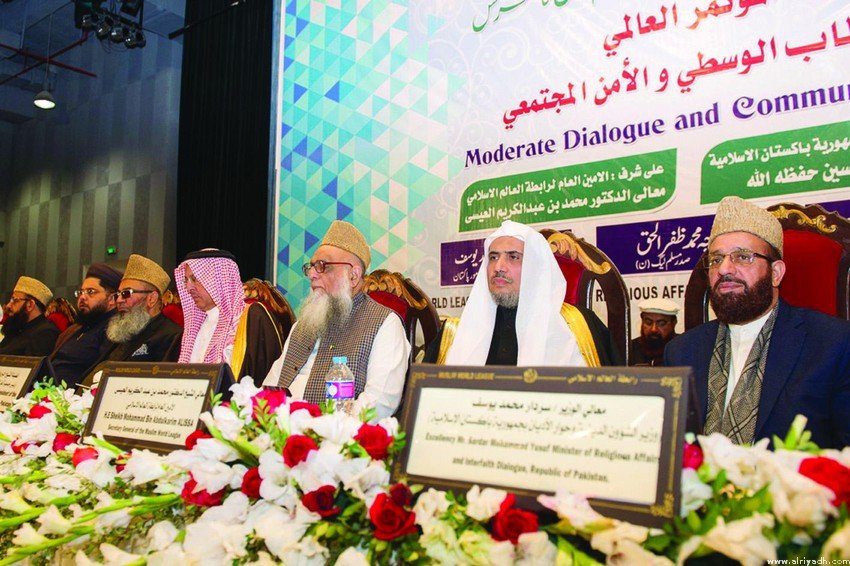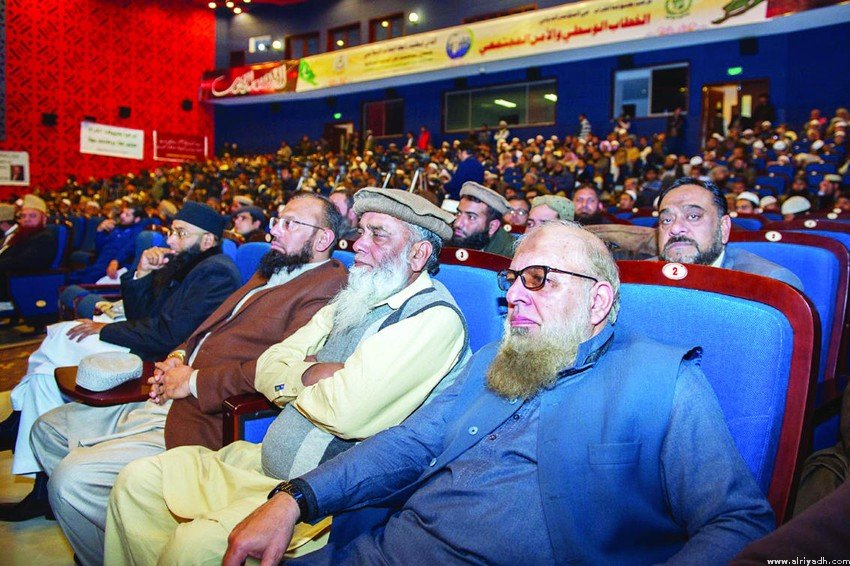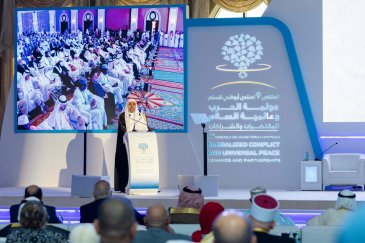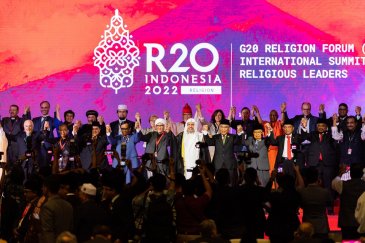Closing Statement of International Conference on Moderate Discourse and community peace
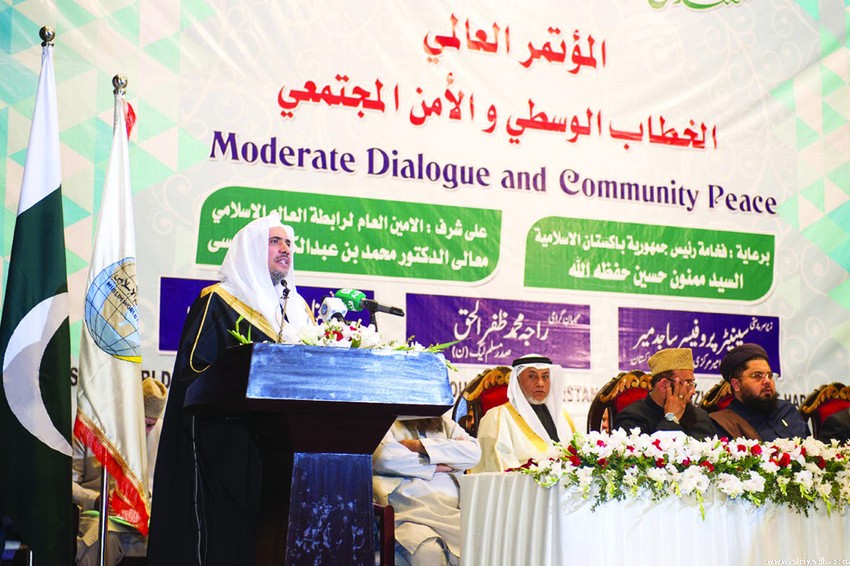
Closing Statement of International Conference
Moderate Discourse and community peace
Organized Muslim World League In collaboration with Ahl-ul-Hadith Central Society (MARKAZI AHLUL HADITH JAMA’A)
Islamabad - Islamic Republic of Pakistan (24-25 Rabi Al-Akhir 1438 H corresponding 22-23 January 2017)
In the name of Allah the Most Gracious the Most Merciful
Praise be to Allah, and peace and blessings be upon the seal of the prophets and messengers, our master and our Prophet Muhammad and his family and companions
- With the help of Allah Almighty World Conference “Moderate Discourse and Community Peace” held by the Muslim World League in cooperation with the Ahl-ul-Hadith Central Association of Pakistan (Markazi Ahl ul Hadith Jama’a), Islamabad Pakistan; during the period of 24/04/25/1438 H corresponding to 22-23/1/2017AD came to conclusion. A constellation of eminent scholars, researchers and university professors from within and outside Pakistan have participated in the meet, where they submitted their research papers and their works based on the following topics:
- Islam and its Moderate Approach
- Ideological Extremism in the Balance of Sharia
- Social Peace a Necessity for our Times
- Challenges of Community Security
- Towards a Safe and Stable Muslim Society
His Excellency the President of the Islamic Republic of Pakistan Mr. Mamnoon Hussein patronized the conference and wished it success.
Then, His Excellency, the Secretary General of the Muslim World League Dr. Mohammed bin Abdulkarim Al-Issa delivered a speech in which he thanked the President and his government for their cooperation in organizing the conference. He also highlighted the enduring dedication of the Rabita in stating Islam’s pristine facts and its tolerant principles. In its diversified activities, the League strives to consolidate moderate and centrist approaches, and counteract the of deviated and aberrant currents . The secretary general is hopeful this conference will provide a clear Islamic vision that will embed the values of moderation in the community; immunize our sons against slipping into the paths of fanaticism and extremism. Furthermore, he hopes that this gathering will stimulate youth of this Umma to work on achieving its security, prosperity and stability, and above all build bridges of peace, coexistence and tolerance with all; and thwart the theories of terrorism which misuses Islam for political purposes; especially to stand up to false slogans and misguiding propaganda. He also stated that Islamic discourse today is passing through theoretical throes and challenging initiatives on the road to a modernization stage that must be compatible with Sharia’s regulation in a changing time, place and events.
His Excellency the Pakistan Minister of Religious Affairs and Interfaith Harmony, Mr. Sardar Yusuf welcomed His Excellency the secretary General and his accompanying delegation. He called for exerted efforts on both official and popular levels to protect future generations and build their character in accordance with Islamic moderate components that shun excess and negligence.
Throughout the sessions, the participants discussed the topic of the conference:
- Islam’s moderation
The participants reviewed the research presented to the conference, which confirmed that moderation is a religious sublime principal and authentic approach, since God has sent His Messenger Muhammad ﷺ with the pure tolerant religion. Since then, and throughout the ages, scholars of Islam have explained this great Islamic principle, and clarified its attributes in its various aspects: basics and branches, creed and worship, ethics, behavior, perception and actions. So Islam spread throughout the earth, and its benefit and goodness encompassed humanity. Allah Almighty in Sura Al-Anbiya, verse 107: (We have sent you (O! Mohammad) but as a mercy to the worlds.
To shed light on the noble Islamic principle, and clarify its facts and concepts, the Conference determined the following:
- Moderation (Wasatiya) is an authentic concept in Islam, anchored in the fundamentals and the values of religion. Therefore, issues of our current era must be addressed within the framework of this great meaning, which has guaranteed humanity’s rights and freedom.
- Moderation in understanding and application of Islam is a clear trait in the existence of the Muslim Umma. It follows the guidance of the Quran and Sunnah, and the example of the righteous predecessors in facing innovations, odd ideas and views on Islam and human society. Allah says in Sura Al-Baqara, verse 143: “And thus we have made you a just community”
- It’s necessary to deeply embed moderation and firmly establish its components within the psyche of the Umma. It’s after all an integral part and a comprehensive approach that will achieve sober and sensible understanding of Islam, and steers away from the trends of extremism and alienation; radicalism, hatred and exclusion.
- Islam’s general features of moderation are translated into charity and justice; integrity, convenience and forgiveness and lifting embarrassment and hardship off Muslims. Allah says in Sura Al-Baqara, verse 185: “Allah intends for you ease and does not intend for you hardship”. He also says in Sura Al-Hajj, verse 78; “and has not placed upon you in the religion any difficulty”.
- Islam, with its tolerant values, fair rulings, comprehensive systems and its unique experience of civilization is and will be able to provide solutions to global problems at any time.
- The greatest responsibility in disseminating Islamic moderation rests with scholars, advocates, educators and the media in educating youth and showing the truth.
- Islamic law is a guarantee to improve people’s worldly living conditions and their eventual final return. It’s the balanced and the most perfected legislation among all religions. A magnificent equilibrium between both worlds the unseen and the real; the individual’s needs and the community’s interests. It elevates the spirit without denying the demands of the body. Allah says in Sura Al-Qasas, verse 77: “But seek, through that which Allah has given you, the home of the Hereafter; and [yet], do not forget your share of the world.”
- Ideological Extremism
The Conference participants discussed the phenomenon of militancy and ideological extremism popping up now and again in various organizations and in different forms. These extremist views have plunged many countries in a state of strife and bitter conflicts, and generated a frayed security, economic deterioration, and social rift.
They agreed that in order to address this phenomenon they must deal with it in an all inclusive way. Its various intellectual, psychological and social dimensions must be investigated. Its causes must be analyzed and its various effects and repercussions must be monitored. Finally an appropriate remedy of its ills must be extracted.
They also emphasized the responsibility of scholars and preachers to enlighten the nation's youth and make them aware of the reality of Islam and its moderate stance, and its opposition to all kinds of extremism and fanaticism. The time has come for scholars to show firmness and determination and thwart any attempts to steer Islam away from the moderate approach and the values of love and brotherhood.
As a warning against the negative effects of the phenomenon of extremism and how to address them, the conference emphasized the following:
- Excess and extremism are a global and old phenomenon and it isn’t confined to Muslims; they don’t reflect the truth of their religion. The Prophet ﷺ has warned his Umma by saying: “Beware of going to extremes in religious matters; for those who came before you were destroyed because of going to extremes in religious matters” (Ibn Majah: 3029).
- Islam is a message of moderation, love and peace. It calls for the rejection of division and discord; it rejects narrow slogans and labels that divide Muslim unity and widen the gap between them. At the same time, Islam warns of the risks of classification and exclusion. Since these elements foster the tendency towards extremism and Takfir.
- It is vital for young people to consult reputable scholars when seeking clarification on ambiguous legal concepts such as Jihad and its rules, Takfir and its prohibition, meanings of loyalty and disavowal, concepts of friendly (Dar-al-Islam) and unfriendly (Dar Al-Harb) countries, and governance. And other matters whose errors and gross fallacies have given rise to deviated ideas.
- It is through erudite scholars that Islam’s correct fundamentals must be known. One should keep away from tendentious propaganda fueled by ideological extremism, and ideas characterized by a spirit of historic hostility.
- The phenomenon of extremism has led to undermine scholars and muftis’ religious authority, and promoted rumors challenging their position, and enticed people to rebel against them. Extremists have even exhorted people to shift their allegiance and follow pseudo scholars and half-educated novice. The latter dared to tackle Fatwa through sheer ignorance, misguidance, or without a guiding book. Thus they deviated and led others astray.
- A severe warning must be issued to caution those who link Islam to the anomalous practices of extremist groups. These have contradicted the consensus of the Umma, and misrepresented the true image of Islam.
- Communal Security
The participants stressed the importance of security in people's lives. Maintaining this security becomes a legitimate demand and a significant necessity for a stable community. The message of Islam is one that implements security, peace and cooperation among the people through righteous conduct and piety. None of this will be achieved but through faith and good deeds. Allah says in Sura Al-An’am, verse 82: “It is those who believe and confuse not their beliefs with wrong - that are (truly) in security.”
They called for disseminating Islam’s noble values and principles which include its sublime ideals that promote relations with others. These ethics are based on well-established rules of justice, compassion and charity. Allah says in Sura An-Nahl, verse 90: “Allah commands justice, the doing of good, and liberality to kith and kin, and He forbids all shameful deeds, and injustice and rebellion”
They warned of ideological aberration that leads to the rebellion against the group, disobeying the ruler and haphazardly accusing Muslims of apostasy; shedding blood, violating what Allah has made sacred, damaging public and private properties.
To achieve security and stability, the participants stressed the following:
- It is important to spread the correct Islamic awareness to enlighten the minds with the sound concepts of Islam, and directs behavior toward doing good and avoiding evil. Moreover, awareness will promote the sanctity of blood in the hearts and awakens a person’s sensibility towards honor and wealth. The Prophet (PBUH) said: Everything belonging to a Muslim is inviolable for a Muslim; his honor, his blood and his property.
- The provisions of Islam and its values are a protective shield that safeguard rights and maximizes the sanctity of blood. It prohibits injustice, aggression and corruption. Allah says in Sura Al-Ma’ida, verse 32: “On that account: We ordained for the Children of Israel that if any one slew a person - unless it be for murder or for spreading mischief in the land - it would be as if he slew the whole people.” Allah also says in Sura Al-Qasas, verse 77: “and seek not (occasions for) mischief in the land: for Allah loves not those who do mischief.”
- The essence of the relationship between Muslims and others is peace, justice and cooperation to do good. Allah says in Sura Almutahina, verse 8: “Allah forbids you not, with regard to those who fight you not for (your) Faith nor drive you out of your homes, from dealing kindly and justly with them:”
- Leaving the Muslim community and shunning their ways, challenging scholars and belittling them have led to the emergence of groups of half-educated in the nation. These have dared to issue fatwa without knowledge or guidance, and permitted corruption on earth. They have undermined security, caused panic and spread chaos. They allowed killing of innocent souls without ever committing a crime. They instigated attack on the sanctity of Allah, based on false interpretations and deceitful tricks.
- The need to exercise extreme caution over sectarian projects that stoke the flame of hatred among Muslims. Such behavior will propel their communities and countries into sedition and sectarian strife. Moreover, the Umma will be blind-sided from realizing its top objectives, for its own benefit first, and humanity at large. After all Muslim nations are an integral part of the world they live in.
- Security, peace and coexistence are components that will achieve total prosperity for all people, however, this prosperity will never materialize without international cooperation and programs where different people and peace loving forces will make it a reality. On one condition: privacy must be respected; rights must be maintained; freedom must be guaranteed, and justice and fairness must be enjoyed by all.
- Islam upholds principles which will assist in achieving peaceful coexistence among peoples and an insightful understanding among civilizations. Furthermore, adhering to the noble Islamic values will definitely lead to positive interactions with a wide range of cultural elements which will consequently improve and promote relations with others.
Recommendations
Following are the recommendations passed by the conference participants:
- Through the diffusion of accurate religious science, facts about Islam will be clarified also, since these stem from the true fundamentals of religion. This must be done away from extremist misrepresentation, dubious fabrications, and uneducated interpretations.
- To correct erroneous ideas on Islam and its provisions by showing the unaltered teachings of Quran and Sunnah. It is a religion that calls for moderation in behavior and way of life; it warns against excessiveness and alienation.
- To improve the moderate discourse taking into account temporal and spatial differences, yet compatible with Islam’s parameters which are based on moderate consistent components. This discourse must take care of current society problems away from emotion and excitement which expresses a momentary reaction and ignores long term effects.
- To address extremism’s currents and trends, and expose the crimes they have committed against true Islam. Youth must be indoctrinated with a culture of moderation to protect them from their dangers. They must be kept as far away as possible from what would fuel dissension, and distance others from Islam and its civilization and its people.
- To streamline education curricula and make them compatible with Islam’s factual approach. Educational institutions’ capabilities must be enhanced to prevent extremist ideology infiltrating this bastion of learning.
- Invite educational and Dawa organizations to promote moderate discourse within the community, and provide rational Islamic vision.
- To invite Islamic governments to train thoughtful scholars to deal with the reality and any novel ideas based on the Quran and Sunnah. Nothing good will come out of this Umma except to follow its early pioneers.
- Scholars, university professors, media are requested to make collective and coordinated efforts to expose the extremists’ fabrications, and reveal their specious arguments. People must be made aware of their fallacious slogans and their empty slogans and claims.
- A comprehensive and integrated strategy plans aimed at coordinating efforts between Islamic organizations, associations, universities and the media channels must be initiated to offset extremist ideology and protect the community from its influence and consequences. A united approach must be started along with discarding slogans, epithets, descriptions that are foreign to the coalescing name of Islam. Any other call outside this custodial and secure perimeter will –God willing- bring the position, affinity and serenity of Muslims together will be considered misguided invitations and evil scheme against Islam and its followers, and will eventually plunge the region into disarray. Today, Muslims are in dire need of a united front to face up to the enemies of the true religion led by the forerunners of a deviant ideology and radical and terrorist actions.
- It is through promoting cooperation and working together that Muslims will be able to settle their quarrels and forget their disputes. Moreover, they must reject fanaticism and narrow-mindedness that are stranger to the encompassing Islam. They must also be courteous and polite in times of disagreement, to accept the truth and to be fair.
- To channel the media to help it contribute in disseminating the culture of peace, understanding and moderation. Credibility and objectivity must be its motto and must keep away from promoting violence and hatred. But most important, multimedia should avoid anything that would trouble brotherly relations and stir tension and discord.
- Invite the Muslim World League to cooperate with official and public institutions in Pakistan for the implementation of joint programs aimed at clarifying erroneous concepts about religion and correct them accordingly, respond to misleading doubt. Young people must be protected from falling preys into the trap of suspicion and extremism.
- Cooperation of the Rabita’s bodies with associations, educational and social institutions in Pakistan, to help Muslims cope with the challenges of poverty, sickness and ignorance, in addition to providing developmental projects.
- To call on all Muslims to hold fast in the strong rope of Allah, and face up to the sectarian projects targeting the unity of Muslims in order to fragment their countries and sow the seeds of hatred among them. Abhorrent practices and behavior of some countries and parties that exploit religion to pass their political and expansionist objectives must be condemned, for using faith for political gains is considered the top crime against Islam.
- Rules regulating the impact of odd Fatawa must be established to curtail their misuse taking into account current changes. Collective fatwa must be promoted during misfortune and for the affairs of the nation in general.
- To provide due care to youths and get them involved in solving their own problems. Rectify their concepts, and bolster their thoughts with right knowledge and wise methods.
- To promote research and studies that embed the principles of Islam and its noble values. However, extremists’ dubious ideas must be refuted and their deviant thoughts must be addressed.
- Scholars, intellectual and propagation meetings must bring Muslims together sans classification and exclusion under any slogan other than that of the unifying Islam and its label and description. The participants warned that following this negative trend will have risky consequences in regard to the dangers surrounding Islam’s reputation. They further stated that this situation calls for redoubled efforts to highlight this true religion’s moderation and tolerance along with the firm belief in the universal idea of difference, diversity and pluralism.
In conclusion, the participants expressed their thanks and appreciation to His Excellency the President of the Islamic Republic of Pakistan, Mr. Mamnoon Hussein for patronizing and supporting the conference. They also thanked Ahl-ul-Hadith Central Association of Pakistan for its efforts in organizing the conference and making it a success; they thanked the Ministry of Religious Affairs of Pakistan for its cooperation in holding the conference as well.
The participants praised the great efforts made by the Custodian of the Two Holy Mosques King Salman bin Abdul Aziz Al Saud, the Crown Prince and Deputy Crown Prince, in their endeavor to unite the Muslims and achieve security, peace and stability in the region. They expressed their pleasure and appreciation to the Kingdom of Saudi Arabia for initiating the Islamic Military Alliance, and establishing the Ideological Warfare Center of the Ministry of defense in the Kingdom. God willing, these two citadels will be the protective shield and the fortress which will safeguard the Muslim Umma’s assets, wealth, resources and youths. Moreover, this fortress will promote ways to achieve world peace and security, especially in defeating and dismantling the message of extremism; the roots that feed violence. Moreover, vacant spaces which were used by fanatics must be filled with a resolute response to disprove terrorist ideas.
The participants thanked the Muslim World League’s blessed efforts in disseminating the tolerant principles of Islam and standing up to the extremism’s unreasonable currents of excessiveness. They also requested the Rabita to develop further activities and programs aimed at promoting community and world peace.
May Allah’s peace and blessing be upon our Master; our beloved Prophet Mohammad, his family and companions.
Released in Islamabad - Islamic Republic of Pakistan
